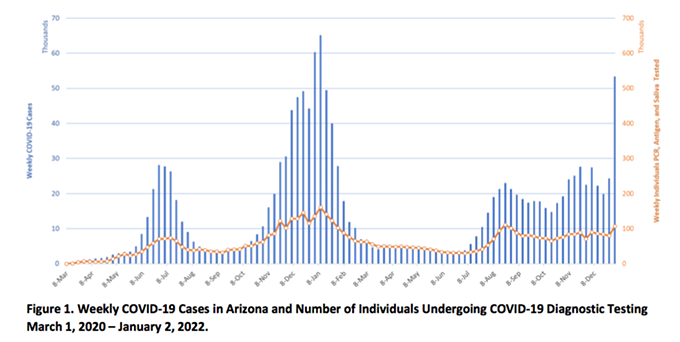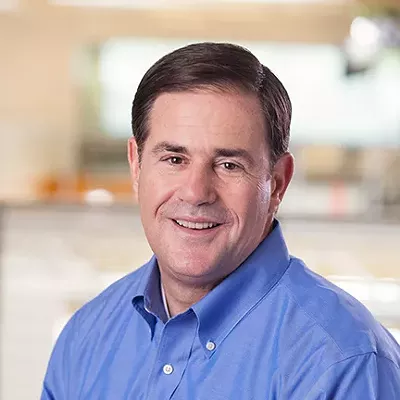Saturday, January 8, 2022
Dr. Joe Gerald: COVID Cases More Than Doubled To Start the New Year
In his latest weekly report , Dr. Joe Gerald, the UA epidemiologist who has been tracking Arizona's COVID outbreak since its earliest days, confirms Omicron is bringing skyrocketing COVID case numbers. A total of 53,207 Arizonans tested positive for COVID in the week ending Jan. 2, which was more than twice as many as the previous week. Along with that 120% increase, cases are being diagnosed at 731 per 100,000.
It's spreading especially fast among those 15 to 24 years of age, who are seeing rates of 1,005 cases per 100K, and lowest among those 65 and older, at 407 cases per 100,000, and those younger than 15, at 409 cases per 100,000. Those high numbers likely undercount the number of positive cases because not everyone who gets COVID will get a test.
Speaking of testing, positivity of those getting tested, which dipped down to the 8% range last summer, jumped to 50% and "remains inadequate for public health practice and many cases are going undiagnosed," according to Gerald.
While people tend to have less severe bouts with Omicron, hospitals are still facing huge pressure, particularly thanks to unvaccinated patients who make up the majority of those who end up hospitalized with COVID.
"While peak occupancy will not reach prior levels, the Delta, and now Omicron, waves have placed much higher levels of chronic stress on our health system," Gerald wrote. "We have so far seen 146 consecutive days with a combined occupancy >2000 patients whereas the summer 2020 and winter 2021 waves saw 57 and 98 days, respectively. Until last week, we had experienced 37 consecutive days with >3000 combined occupancy whereas the summer 2020 and winter 2021 waves saw 35 and 78 days, respectively. After a 10-day respite over Christmas-New Years, we are once again >3000 combined occupancy (last 4 days)."
Gerald—whose opinions are his alone, not those of the UA Zuckerman School of Public Health—says too many elected leaders are pursuing business-as-usual policies in the face of the wave and “the outcome will be more death and disability than necessary, more death and disability than others in similar circumstances will experience."Here's Gerald's complete note. His weekly summary is attached as a PDF:
Today, I am reminded of the M*A*S*H* episode, Preventative Medicine, where Hawkeye performs an appendectomy on Lieutenant Colonel Lacy, a commander whose unit suffered more causalities than any other in theatre. Of course, the Colonel's appendix was perfectly normal. Hawkeye, through frustration, violated his Hippocratic Oath to 'do no harm' in order to serve a greater good by operating on the commander and getting him off the battlefield.
Why am I reminded of this now? Well, Arizona's leaders are recklessly pursuing a "new normal" strategy on the eve of Arizona's largest SARS-CoV-2 outbreak of the pandemic. As I type this, we are setting new records for viral transmission; yet, our state, county, and institutional leaders are maintaining their laissez-faire stance. Sadly, the outcome will be more death and disability than necessary, more death and disability than others in similar circumstances will experience.
I struggle to understand why our leaders are willing to take such great risks, to take such strong stands to avoid the costs necessary to protect those entrusted to their care. Have our leaders lost any sense of noblesse oblige? Must every decision be transactional where no sacrifice is too small to be avoided? Our current stance only make sense when transactional gains are concentrated among the privileged and the harms spread diffusely among the disadvantaged.
My public health colleagues have argued for more aggressive action. We have provided ample warning of the potential and likely consequences. Our leaders have failed to head these warnings. Assuredly, not all of us are going to die. In fact, most of us will be just fine. But why should we accept such a high requirement before acting? Are 30,000 Arizonan deaths not enough? How many more are we willing to throw on the pyre for the appearance of 'normalcy?'














